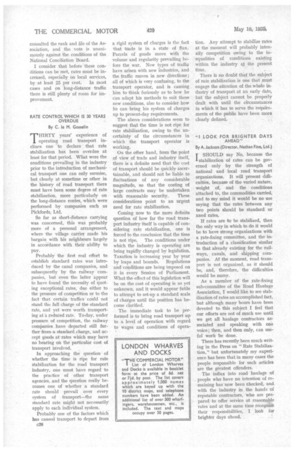RATE CONTROL WHICH IS 30 YEARS OVERDUE
Page 86

If you've noticed an error in this article please click here to report it so we can fix it.
By C. le M. Gosselin
'THIRTY years' experience of 1. operating road transport inclines one to declare that rate stabilization has been overdue at least for that period. What were the conditions prevailing in the industry prior to the introduction of mechanical transport one can only surmise, but clearly at sometime or other in the history of road transport there must have been some degree of rate stabilization, more particularly on the long-distance routes, which were performed by companies such as Pickfords, Ltd.
So far as short-distance carrying was concerned, this was probably more of a personal arrangement, where the village carrier made his bargain with his neighbours largely in accordance with their ability to Pay.
Probably the first real effort to establish standard rates was introduced by the canal companies, and subsequently by the railway companies, but even the latter appear to have found the necessity of quoting exceptional rates, due either to the pressure of competition or to the fact that certain traffics could not stand the full charge of the standard rate, and yet were worth transporting at a reduced rate. To-day, under pressure of competition, the railway comi)anies have departed still further from a standard charge, and accept goods at rates which may have no bearing on the particular cost of transport involved.
In approaching the question of whether the time is ripe for rate stabilization for the road transport industry, one must have regard to the practice of other transport agencies, and the question really becomes one of whether a standard rate should prevail over every system of transport—the same standard rate might not necessarily apply to each individual system.
Probably one of the factors which has caused transport to depart from c28 a rigid system of charges is the fact that trade is in. a state of flux. Parcels of goods move with the volume and regularity prevailing before the war. New types of traffic have arisen with new industries, and the traffic moves in new directions ; all of which is very confusing, to the transport operator, and is causing him to think furiously as to how he can adapt his methods to suit these new conditions, also to consider how he can bring his system of charges up to present-day requirements.
The above considerations seem to suggest that the time is not ripe for rate stabilization, owing to the uncertainty of the circumstances in which the transport operator is working.
On the other hand, from the point of view of trade and industry itself, there is a definite need that the cost of transport should be quickly ascertainable, and should not be liable to fluctuations of any considerable magnitude, so that the costing of large contracts may be undertaken with reasonable security. These considerations point to an urgent need for rate stabilization.
Coming now to the more definite question of how far the road transport industry itself is capable of considering rate stabilization, one is forced to the conclusion that the time is not ripe. The conditions under which the industry is operating are being rapidly changed by legislation. Taxation is increasing year by year by leaps and bounds. Regulations and conditions are being imposed on it in every Session of Parliament. What the effect of this legislation will be on the cost of operating is as yet unknown, and it would appear futile to attempt to set-up a standard scale of charges until the position has become clarified.
The immediate task to be performed is to bring road transport up to a level of operation with regard to wages and conditions of opera tion. Any attempt to stabilize rates at the moment will probably intensify competition owing to the inequalities of conditions existing within the industry a,t the present time.
There is no doubt that the subject of rate stabilization is one that must engage the attention of the whole industry of transport at an early date, but the subject cannot be properly dealt with until the circumstances in which it has to serve the requirements of the public have been more clearly defined.,
"I LOOK FOR BRIGHTER DAYS AHEAD" By A. Jackson (Director, Nathan Fine, Ltd.)
TSHOULD say No, because the
stabilization of rates can be governed only by the strength of national and local road transport organizations. It will present difficulties, because of the varied nature, weight of, and the conditions attached to, the commodities carried, and to my mind it would be no use saying that the rates between any two points should be standard or nxed rates.
If rates are to be stabilized, then the only way in which to do it would be to have strong organizations with a rate-fixing committee, and the in troduction of a classification similar to that already existing for the railways, canals, and shipping companies. At the moment, road transport is not organized, as it should be, and, therefore, the difficulties would be many.
As a member of the rate-fixing sub-committee of the Road Haulage Association, I would like to see stabilization of rates an accomplished fact, but although many hours have been devoted to this subject I feel that our efforts are not of much use until we get all haulage contractors associated and speaking with one voice; then, and then only, can useful work be done.
There has recently been much writing in the Press on "Rate Stabilizafion," but unfortunately my experience has been that in many cases the people responsible for such articles are the greatest offenders.
The influx into road haulage of people who have no intention of remaining has now been checked, and with the industry in the hands of reputable contractors, who are prepared to offer service at reasonable rates and at the same time recognize their responsibilities, I look for brighter days ahead.




































































































































































